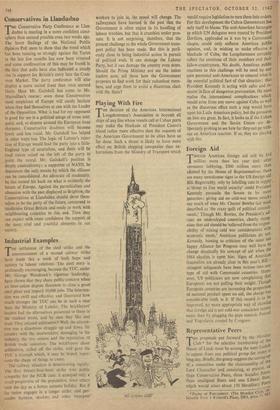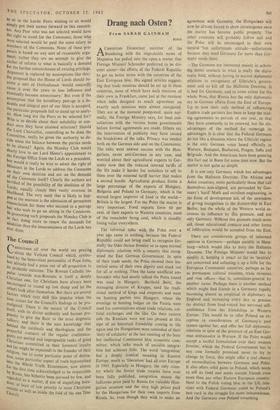Representative Peers
HE proposals put forward by the MondaY 1 Club * for the selective membership of the House of Lords must be among the most foolish to .appear from any political group for manY long day. Briefly, the group suggests the setting-up of a committee under the chairmanship of the Lord Chancellor and consisting, at present. 01 three Conservative Peers, three Socialist Peers' three unaligned Peers and one Liberal peer, peel which would select about 150 Hereditary .*P.Fas OF PARLIAMENT. (The Monday Club: &Ili tamable from 1 Richard's Place, SW3, price 16. ' to sit in the Lords. Peers wishing to sit would simply put their names forward to this commit- tee. Any Peer who was not selected would have the right to stand for the Commons; those who Were selected would be paid the same salary as members of the Commons. None of these pro- posals is based on any sort of reasonable argu- ment; rather they are an attempt to give the cachet of reform to what is basically a demand for the further entrenchment of existing privilege. Argument is replaced by assumptions like this: the proposal that the House of Lords should be- come a sort of Ombudsman 'would assuredly cause it over the years to lose influence and eventually become unnecessary.' But even if the assumption that the hereditary peerage is a de- sirable and integral part of our State is accepted, the particular proposals fail to stand up to analy- sis. How long are the Peers to be selected for? Who is to decide about their suitability or con- duct once they have attained selection? Should the Lord Chancellor, controlling as he does the Committee, really be given the authority to de- cide when the balance between the parties needs to be altered? Again, the Monday Club would dearly love to see Lord Home's appointment to the Foreign Office from the Lords as a precedent, but would it really be wise to admit the right of Ministers in the Lords to address the Commons on their own decision and not on the demand of the Commons itself? Clearly the authors are terrified of the possibility of the abolition of the ,L.°rds; equally clearly they vastly overrate its likelihood. The very most that is likely to hap- Pen at the moment is the admission of permanent but for those who succeed to a peerage b_nt who wish to go on sitting in the Commons. !n promoting such proposals the Monday Club is 1 fact doing more to renew the demands for than the innocuousness of the Lords has ever done.







































 Previous page
Previous page